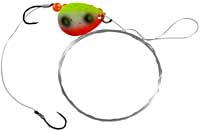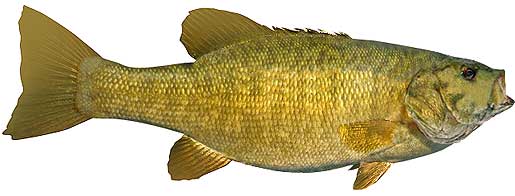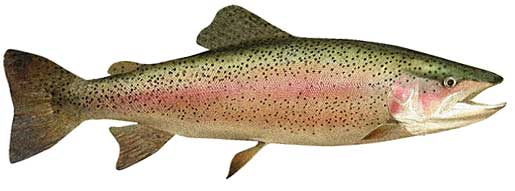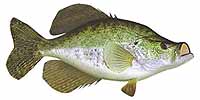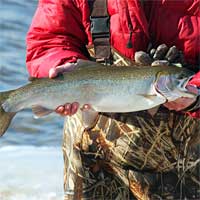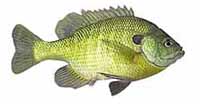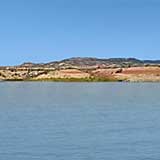Fishing Report For Abiquiu Reservoir, NM
By Rick Seaman
Last updated on .
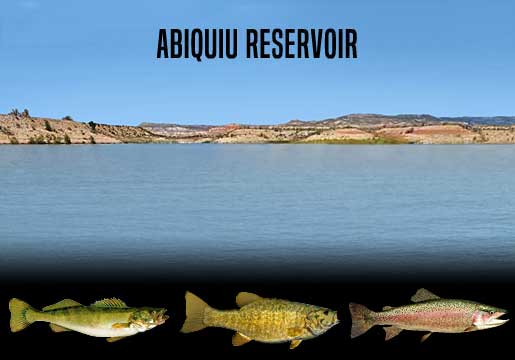
Fishing Reports
Popular Fish Species Abiquiu Reservoir, NM
Fishing Report: Walleye
Current Report: Fair To Good
Spring and Fall are the best seasons for catching walleye, as they spend a great deal of time in shallower water.
FALL. Fall brings cooler temperatures to shallow water, drawing walleye and baitfish shallower. Jigs, swimbaits, spoons, crankbaits, jerkbaits, and spinnerbaits are all historically good for catching walleye this time of year. Early Fall finds them in 8 to 20 feet of water. Later in Fall, they move out slightly deeper again. Dragging jigs, worm harnesses or bottom bouncers, with nightcrawlers or leeches, around ledge drop-offs works well. Watch for the bigger walleye to be slightly deeper than the majority of the school.
WINTER. This Winter fishing for walleye was slow. Anglers report catching them in 25 to 45 feet of water, along creek channel edges, rocky humps and ledges. They primarily feed on small fish, staying close to the bottom. Blade baits, jigs, swimbaits, spoons, deep-diving crankbaits, and worm harness spinners, are all options while deep trolling or slow drifting.
SPRING. Early Spring brings warming water in the shallows, and draws walleye here to feed, especially rocky areas and inlet channels. Here they will spawn once the water warms to the mid to high 40's. Afterwards, they move to 30 to 60 feet deep around shallow points, flats, shoals and ledges, nearby shore, often staying in close proximity to their spawning locations. When they move shallow, bright colored jigs, tipped with nightcrawlers typically catch them in 10 to 20 feet of water. Spinnerbaits, jerkbaits and crankbaits are also working when walleye are up shallow.
SUMMER. Water temperatures rise in Summer, and walleye fishing is good if you can get your bait deep enough. Walleye tend to concentrate in 15 to 25 feet of water, preferring the cooler temperatures. Throughout Summer, early in the morning, and from dusk to long after dark are good times to catch walleye. At those times they move slightly shallower to feed in low-light conditions. Night fishing is often good in Summer, as well. The rest of the time they are cruising flats and creek channel edges, where they are more difficult to locate. When the bite is slow, grubs and nightcrawlers, fished just off the bottom are catching walleye.
Fishing Report: Smallmouth Bass
Current Report: Good
SUMMER. Smallmouth bass are currently feeding 5 to 10 feet deep, early and late in the day. They are being caught on topwater, crankbaits, swimbaits, Ned rigs and tube baits. Smallmouth bass here feed on crawfish and small sunfish. They prefer rocky or gravel bottom areas, as this is where crayfish live. During the hotter parts of the day, they are being caught on points, humps, and ledges 12 to 20 feet deep. Often these deeper fish are part of a large school of smallmouth.
FALL. As Fall arrives, smallmouth here follow schools of baitfish into coves and bays, where spoons, drop-shots, and slow-rolled spinnerbaits, are very successful. Fishing shallow for smallmouth, in 5 to 8 feet of water, is often good on cold, windy, cloudy and rainy days.
WINTER. Winter will isolate them around deeper structure, points and creek channels, often suspending in open water above these features. They can generally be found from 20 to 30 feet deep. Here they hold, feeding less frequently, awaiting warmer water to return in Spring.
SPRING. When water temperatures rise into the 50's now, smallmouth will move from deeper wintering spots, to shallower water just outside spawning areas. They feed heavily at this time, and are typically caught on jerkbaits, crankbaits, tube baits, Ned rigs, and crayfish imitating plastics. They will be preparing for the spawn. Once water warms into the high 50's, they move into shallower water, and create nests in gravel or sand areas, then lay their eggs. Females then move to deeper water and males remain to guard the eggs, and then the fry. After a couple weeks, the males also move to slightly deeper water and feed aggressively. Crankbaits, tube baits, Ned rigs, plastic worms, spoons and swimbaits are catching smallies during this period.
Fishing Report: Rainbow Trout
Current Report: Good To Very Good
Fly fishing is not covered in this website, but rainbow trout are being caught on plenty of other lures and bait.
FALL. Cooling water temperatures in the shallows, draw rainbow trout out of deeper Summer depths. Anglers are now catching them 5 to 15 feet deep on rocky banks, wind-blown points, rocky structure, humps, and anywhere baitfish are gathering. Now that they had a full summer to grow, there are some nice size rainbow to be caught. Small spinners, spoons, jigs, miniature crankbaits and swimbaits are good choices, as are salmon eggs and prepared baits. Later in Autumn, they move into 15 to 25 feet of water.
WINTER. When Winter sets inn jigging spoons, and jigs tipped with bait, are catching nice limits of rainbows out of 25 to 35 feet of water. Deep trolling with leaded line or downriggers, or vertical jigging with spoons and jigs, are the best approach during the cold-water season.
SPRING. As water begins to warm in early Spring, rainbow trout move from their late winter holding areas to shallow, warmer water 5 to 15 feet deep. A good number of rainbows are typically caught from mid morning to late afternoon, during the warmest water of the day. Shallow flats and rocky structure are quick to warm in the afternoon sun. A wide variety of small spinners, spoons and bait are catching most of the fish.
SUMMER. Once Summer is here to stay, the warmer water drives rainbow deeper, 20 to 30 feet deep, occasionally deeper. Trolling with spoons, spinners and crankbaits, using downriggers or leaded line, and drift fishing with bait, are currently the most productive methods. Following drop-offs into deeper water, along structure or creek channels, is a major key to getting bites. Anglers fishing from the bank are using nightcrawlers or Berkley PowerBait, with heavy weights on a Carolina rig, to get baits in deeper water.
Fishing Video
Fish species to fish for...
Guide to fishing for largemouth bass, smallmouth bass, channel catfish, white crappie, walleye, rainbow trout, brown trout, kokanee salmon and bluegill at Abiquiu Reservoir in New Mexico.
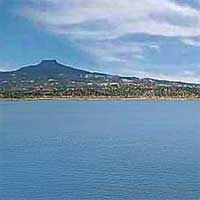
Abiquiu Lake is a 5,200-acre lake with over 25 miles of shoreline to explore. Enjoy fishing for bass, catfish, crappie, walleye, trout and bluegill. There are several areas around the lake with good access for fishing from the bank.
Primary fish species to catch
Click images for fishing tips and details about each species.
Today's Weather & Forecast
Public Boat Launch Ramps & Landings
Click here for boat ramps.
Fishing License
Click here for a New Mexico Fishing License.
Map - Fishing & Access
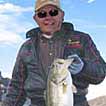
Rick Seaman is a fishing enthusiast with over five decades of fishing experience, a retired tournament fisherman, author of numerous published articles on fishing, and co-author of the book "Bass Fishing - It's not WHAT you throw, It's WHERE you throw it".
Contact Information
U.S. Army Corps of Engineers
4731 State Highway 96
Abiquiu, NM 87510-0290
505 685-4371
Fishing lakes in each state
010826
Abiquiu Reservoir, NM Report
NEW MEXICO


Fishing for bass, trout and walleye in northwest NM.





